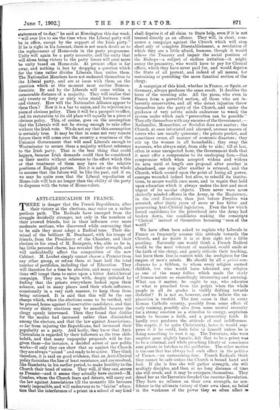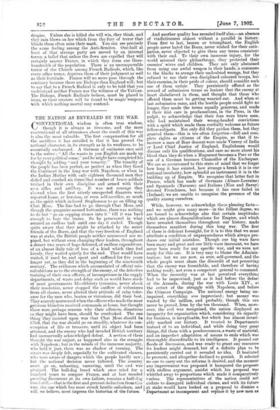ANTI-CLERICALISM IN FRANCE. T HERE is danger that the French Republicans,
after their victory at the elections, may enter on a rather perilous path. The Radicals have emerged from the struggle decidedly stronger, not only in the numbers of their avowed friends, but in their influence over more moderate sections, who discovered while canvassing that to be safe they must adopt a Radical tone. Their dis- missal of the brilliant M. Deschanel, with his troops of friends, from the Presidency of the Chamber, and their election in his stead of M. Bourgeois, who, able as he is, has little personal charm, has revealed their strength, and will undoubtedly affect the composition of the new Cabinet. M. Loubet simply cannot choose a Premier from any other group, or refuse them at least half the total number of portfolios, including that of Education. They will therefore for a time be absolute, and many considera- tions will tempt them to enter upon a bitter Anti-Clerical campaign. They are, to begin with, deeply irritated by finding that the priests everywhere looked upon them askance, and in many places used their whole influence, occasionally in a very rash manner, to keep them from being returned. It is said that this will be the one charge which, when the elections come to be verified, will be pressed home against Conservative candidates, and that twenty or thirty elections may be annulled because the clergy openly intervened. Then they found that dislike for the monks had increased rather than diminished among the electors, and that the law against Associations, so far from injuring the Republicans, had increased their popularity as a party. And lastly, they know that Anti- Clericalism is regarded by their followers as the true shib- boleth, and that many unpopular proposals will be for- given them—for instance, a decided arrest of new public works—if only they can show that as against the Church they are always " sound " and ready to be active. They think therefore, it is said on good evidence, that an Anti-Clerical policy furnishes the line of least resistance, and are resolved, like Gambetta in his earlier period, to make hostility to the Church their bond of union. They will, if they can, secure as Premier—and it seems they actually have secured—M. Combos, whom the Church fears and detests, will carry out the law against Associations till the monastic life becomes nearly impossible, and will endeavour so to "laicise" educa- tion that the interference of a priest in a school of any kind shall deprive it of all claim to State help, even if it is not treated directly as an offence. They will, in short, com- mence a campaign against the Church which will stop short only of complete Disestablishment, a revolution of which they are a little afraid, because, though it would relieve the Treasury and impair the social position of the Bishops—a subject of endless irritation—it might annoy the peasantry, who would have to pay for Clerical offices, which they have never paid for, and would deprive the State of all pretext, and indeed of all means, for restraining or punishing the more fanatical section of the clergy.
A campaign of this kind, whether in France, or Spain, or Germany, always produces the same result. It doubles the force of the resisting side. All the pious, who even in France form a powerful section, all those who are in- herently conservative, and all who detest injustice throw themselves into the party of the Church, and under the guidance of very astute minds endeavour to wreck the system under which such " persecution can be possible." They ally themselves with any enemies of the Government,— Nationalist, Monarchist, or Socialist does not matter ; the Church, at once infuriated and alarmed, arouses masses of voters who are usually quiescent ; the priests predict, and sometimes cause, all manner of economic disasters ; they stir up the women in all households ; they sway the waverers, who always exist, from side to side ; till at last, often in some unexpected hour, the Government finds that it must offer a compromise to its unsleeping foes,—that compromise which when accepted widens and widens its area until at length one proposal after another is abandoned, one step after another is retraced, and the Church, which seemed upon the point of losing all power, emerges wounded indeed but alive, to rebuild its institu- tions, to secure wealth once more, and to regain that hold upon education which it always makes the first and most urgent of its secular objects. There never were more clerically minded officers in the Army, in the Magistracy, in the civil Executive, than just before Dreyfus was arrested, after thirty years of more or less bitter and persevering Anti-Clerical legislation. Even the law which forced candidates for the priesthood into the Army had broken down, the candidates making the conscripts " Clerical " instead of themselves becoming " men of the world."
We have often been asked to explain why Liberals in France so frequently assume this attitude towards the Church, and no doubt it is at first sight not a little puzzling. Naturally one would think a French Radical would be the most tolerant of mankind, would smile at the faith of the clergy, and gently ridicule their teaching, but leave them free to contest with the irreligious for the empire of men's minds. He should by all a priori con- clusions be a Gibbon, to whom every religion seemed childish, but who would have tolerated any religion as one of the many follies which made the study of human nature so exceedingly interesting and amusing. What can it matter, he ought to say, who educates or what is preached from the pulpit when the whole people in all its grades is visibly drifting towards disbelief ? It is not so, however, and we believe the ex- planation is twofold. The first cause is that in every Roman Catholic country, possibly from some effect of early training, possibly also from some mental necessity for a strong emotion as a stimulus to energy, scepticism tends to become a faith, and a persecuting faith. It hardly ever produces the attitude of cool indifference. The sceptic, if he quits Christianity, hates it, would sup- press it if he could, feels false to himself unless he is doing something to root it up. The Terrorists, who were sceptics gone slightly lunatic, felt that to be a priest was to be a criminal, and while preaching liberty of conscience sent priests in batches to the guillotine. The other motive is the one that has always had such effect in the politics of France,—an unreasoning fear. French Radicals think they cannot be safe unless the Church is bound hand and foot. If she is free she will gather strength, she will multiply disciples, and then at no long distance of time she will crush, and it may be extirpate, themselves. They dread her as the Terrorists dreaded the counter-Revolution. They have no reliance on their own strength, no con- fidence in the ultimate victory of their own ideas, no belief in the weakness of the power they so often affect to despise. Unless she is killed she will win, they think, and they rain blows on her which from the fury of terror that blinds them often miss their mark. You can see precisely the same feeling among the Anti-Semites. One-half at least of that strange party are moved by an internal terror, a belief that unless the Jews are expelled they will certainly master France, in which they form one three- hundredth of the population. There is an unconquerable terror of the Church among French Radicals, which, like every other terror, deprives them of their judgment as well as their fortitude. France will no more pass through the seminary because there are Bishops than England will; but to say that to a French Radical is only to be told that you understand neither France nor the wiliness of the Vatican. The Bishops, French Radicals believe, must be placed in irons, or their croziers will be found to be magic weapons with which nothing mortal may contend.







































 Previous page
Previous page